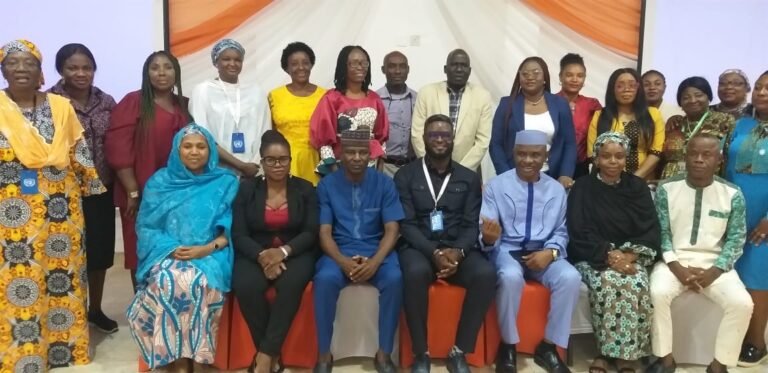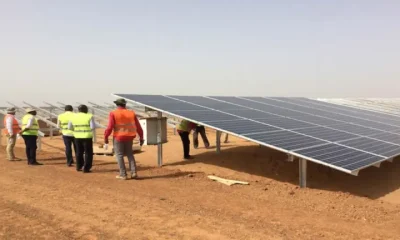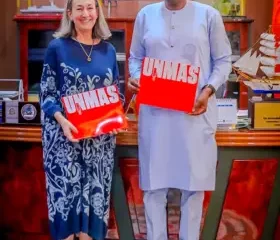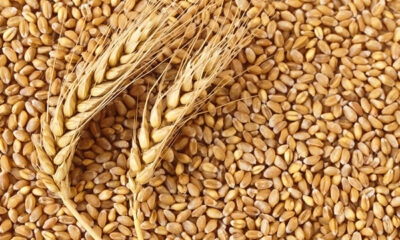News
FGM: FG inaugurates committee to eliminate practice in Nigeria

The Federal Government and other stakeholders have inaugurated a ministerial ad hoc committee to eliminate the practice of Female Genital Mutilation (FGM) in Nigeria.
The committee was inaugurated on Monday in Abuja by the Director, Family Health, Ministry of Health, Dr Boladele Alonge.
Alonge was represented by Dr John Ovuoraye, the Head of Gender, Adolescent School Health and Elderly Care (GASHE) division of the ministry.
She said it was estimated that globally at least 200 million girls and women have been subjected to the practice of FGM.
Alonge added that about 10 per cent of the number of those affected reside in Nigeria.
She added that “although the Nigeria Demographic and Health Survey (NDHS) reported a decline in the national prevalence of the practice between 2013 and 2018, some three million girls and women are still at risk.”
She defined FGM as all procedures involving partial or total removal of the female external genitalia or other injury to the female genital organs for non-medical reasons.
According to her, the act is a violation of the human rights of women and girls.
Alonge said that the National Policy and Plan of Action for the Elimination of FGM provided a clear plan to guide activities of different stakeholders in all fields.
It also provided a clear plan to guide systems and practices, including request that attention be given to identified emerging hotspot states, she added.
She explained that “the purpose is to ensure that men and women, boys and girls in all their diversity are well informed on the dangers of the practice of FGM and be fully involved in the elimination process of the barbaric custom.
“The committee is therefore expected to work with the national technical committee which is the central coordinating and advisory body to the Federal Ministry of Health on issues of FGM toward implementing activities to eliminate the menace.’’
Dr Christian Subam, the Officer-in-Charge, United Nations Population Fund (UNFPA) Nigeria, said that according to UNFPA estimates in 2023, more than 4.3 million girls are at risk of FGM.
According to him, the number is projected to reach 4.6 million by 2030, as conflicts, climate change, rising poverty and inequality continue to hinder efforts to transform gender and social norms that underpin the harmful practice and disrupt programmes that help protect girls.
He added that “in Nigeria, the NDHS 2018 notes that 20 per cent of all women aged 15 to 49, have undergone FGM, while 19.2 per cent of girls age 0 to 14 have undergone FGM.
“This is in spite of a decrease in the national prevalence from 25 per cent to 20 per cent (2013, 2018 NDHS).
“Nigerian women and girls represent 22 per cent of the 68 million at risk of being mutilated by 2030, which is 14.8 million women and girls.”
Sabum said that medicalisation of FGM in Nigeria remained a threat, as well as the need for escalated awareness creation, which must all be addressed urgently.
“The UNFPA led Joint Programme with UNICEF to eliminate FGM is the largest global and national programme to accelerate the abandonment of the harmful traditional practice and thereby advance the rights, health and well-being of women and girls.’’
He reiterated UNFPA’s commitment to address the menace and the three transformative results which are; to end maternal deaths, end unmet need for family planning and end Gender Based Violence and harmful traditional practices, including FGM.
“Let’s work together within the framework of the Sustainable Development Goals.
“The policies and laws of the land aligning to strategic direction set out for all of us in the National Policy and Costed Plan of Action for Elimination of FGM in Nigeria (2021-2025) that was developed and inaugurated with support from the joint programme.
“The formation of this committee marks a momentous occasion, signifying the government’s unwavering commitment to protecting the rights and dignity of our girls and women.”
Mr Iliyasu Zubair, the Head of Women’s Rights and Protection, Ministry of Women Affairs, said that the ministry had under the Social Component of its budget for 2023, earmarked N200 million to fight harmful traditional practices which includes FGM.
He said that FGM took the largest share of the harmful practices as one of the health challenges in Nigeria.
He called on all stakeholders to collaborate to bring an end to the harmful traditional practice, saying “we all know the damage the practice of FGM has caused to the female gender, from childhood to adulthood and how it also affect families and marriages.
“I call on all the stakeholders to come together to bring an end to it.”
Mrs Yewande Gbola-Awopetu, the Head, Sexual and Gender-Based Violence (SGBV) Response/Gender Unit, Ministry of Justice, said that the ministry is aware that prosecution is key to ensuring deterrence of such violence against the girl child and wowomen.Gbola-
Gbola-Awopetu, who was represented by Temitayo Lawal, Legal/Gender Desk Officer, said that prosecution would ensure that perpetrators know that government meant business.
“We are working to ensure effective prosecution and ready to work with elevant stakeholders to strengthen the mechanism for response to this vile practice, reduce and ultimately eliminate FGM in Nigeria.
“As we are all aware, the Nigerian government has taken steps to provide a legal framework for the protection of women from FGM through robust human rights provisions in the 1999 Constitution, as well as the Violence Against Persons Prohibition (VAPP) Act 2015.
“The Nigerian government is adopting these three pronged approach.
“Section six of the VAPP ACT 2015 specifically provides for the prohibition of FGM with a penalty not exceeding four years imprisonment or a fine not exceeding N200,000 or both for anyone found guilty of performing FGM or engaging another person to perform it.”
She, however, said that the focus in the Ministry of Justice is to ensure increase in the level of awareness and implementation of these laws at the Federal, State and local government levels.
The News Agency of Nigeria (NAN) reports that the 11-member committee consists of members of Family Health Department in Ministry of Health, Ministry of Women Affairs, Ministry of Education, Ministry of Information and Culture and Ministry of Youth and Sport Development.
Others are Ministry of Finance, Budget and National Planning, National Human Rights Commission, The Nigeria Police, UNFPA and UNICEF.
News
Woman killed while crossing road in Anambra

The Federal Road Safety Corps (FRSC), Anambra State Sector Command, has confirmed the death of a woman in an accident at Okpoko Market on the Asaba-Onitsha Road.
The Sector Commander, Mr Adeoye Irelewuyi, who confirmed the accident to journalists in Awka on Thursday, said that the woman was hit while she was crossing the road.
He said that the accident, which occurred on Wednesday, involved a commercial tow truck with registration number XA550BMA.
“Eyewitness report reaching us indicates that the truck was towing a vehicle in an uncontrollable speed along the axis.
“The vehicle that was being towed got detached from the tow truck.
“It hit and killed a female adult, who was said to be crossing the road, while the tow truck continued its movement.
“FRSC rescue team came to the scene and took the woman to Toronto Hospital, Onitsha, where she was confirmed dead and her body deposited at the hospital’s mortuary,” he said.
While sympathising with the family of the dead, the sector commander urged motorists, especially tow truck drivers, to exercise a high level of professionalism.
He also urged the drivers to always use standard equipment and avoid speeding.
News
LASG’s maize palliative impactful, says poultry association chair

The Chairman, Poultry Association of Nigeria (PAN), Lagos State Chapter, Mr Mojeed Iyiola, said the state government’s maize palliative to members of the association made a positive impact on the sector.
Iyiola said this in an interview with the News Agency of Nigeria (NAN) on Thursday in Lagos.
“We received about 150,000 tons of maize in February from the Lagos State government as palliative to cushion the effect of high feed prices.
“The major benefit of the palliative is that it actually cushioned the cost of production for most poultry farmers in the state.
“The palliative was beneficial as it made the cost of some poultry produce, especially eggs to drop,” Iyiola said.
He noted that prior to the palliative, a crate of egg was sold between N3,500 and N3,700 at the farm gate, but after the palliative, it now sells between N3,200 and N3,400.
According to the PAN chair, retailers and middlemen who sell from N3,800 to N4,200 do that for their personal gain.
“We have urged our members to sell their eggs at reasonable prices following the receipt of the palliative from the government.
“We appreciate the Lagos State government for the palliative but we also urge the federal government to do likewise, to further reduce the cost of production in the sector.
“This will consequently lead to drop in the prices of all poultry produce across board,” he said.
He said the palliative was shared among financial members of the association at no extra cost.
“As an association we shared the grains equally across PAN’s eight zones in the state equally. We also mandated each zone not the sell even a grain of the maize.
“We, however, considered new poultry farmers who wanted to the join the association as beneficiaries of the palliative,” said Iyiola.
He noted that through the palliative, more poultry farmers were recruited into the association.
“The maize was shared only to poultry farmers and not feed millers, it is the major component of poultry feed formulation,” he said.






















